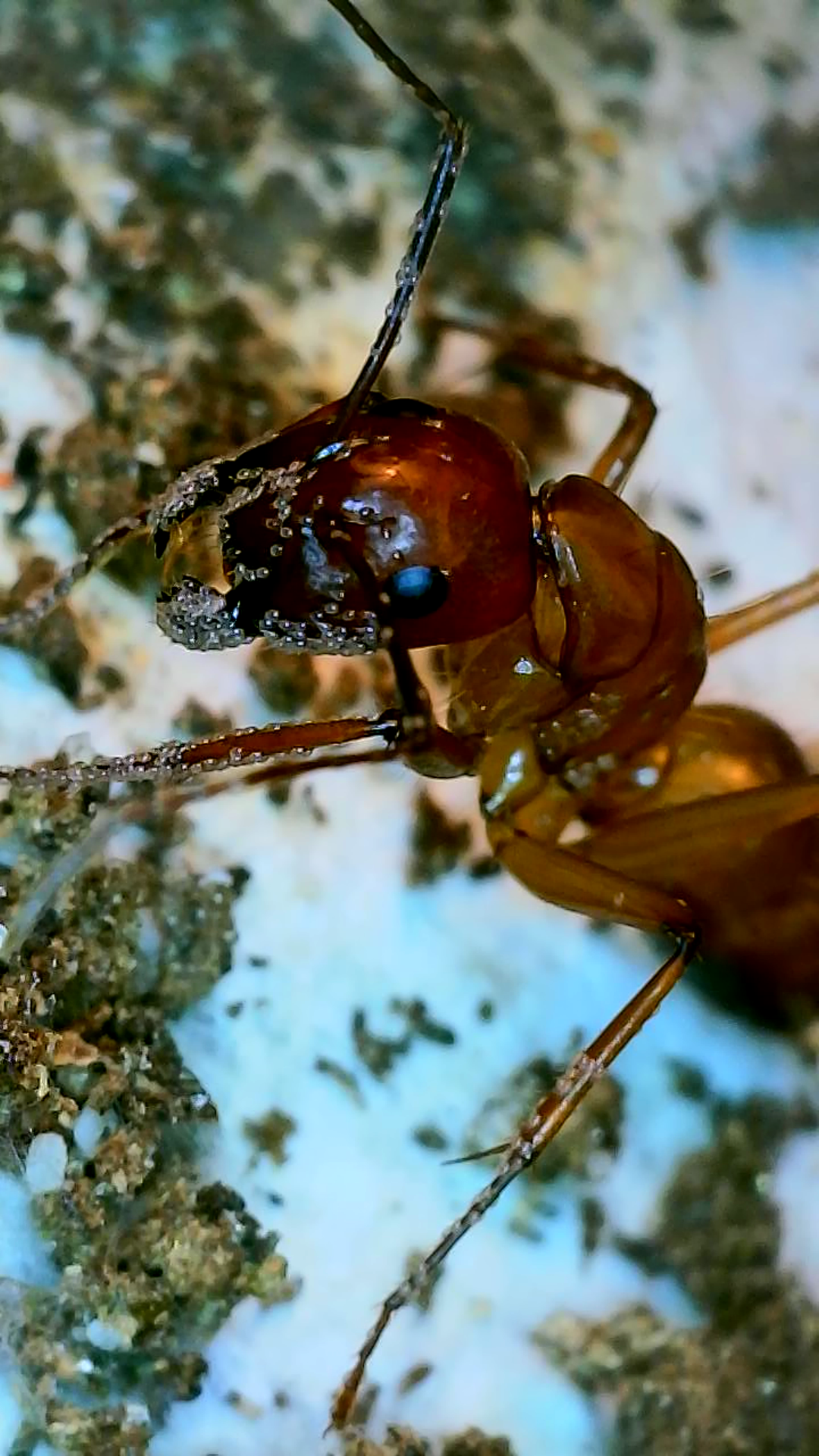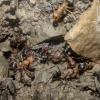
This is the only ant so far that I've seen with them but telling by the amount of mites she has I suspect more have some. Please help.
Thanks
-VAA


Sometimes mites are attracted to ants nearing the end of their life. It's not so much that the mites kill the ant, more that she's in decline and attracts them. If it's just the one ant you could remove her.
I only saw mites when I was using a moist nest with Camponotus pennsylvanicus. and those ants don't benefit from a moist nest. Since this is a large Campnotus, maybe ease up on hydration of the nest. At the same time put out more options for drinking water so that they don't risk dehydration. How many ants are in the colony? Do they have brood?
Starting this July I'm posting videos of my ants every week on youTube.
I like to make relaxing videos that capture the joy of watching ants.
If that sounds like your kind of thing... follow me >here<.
Hello Virginian ants;
If I had an ant like that in one of my colonies, I would remove it immediately with no regrets and pray the mites haven't spread to anyone else.
RPT
Edited by Virginian_ants, February 13 2024 - 4:28 AM.
If there were mites in the trash, I would guess they probably aren't parasitic at least.
These are 100% the dreaded Acarus mite that often plagues antkeepers and kills colonies. You most likely got these mites with your colony when you purchased it, or you do not have the adequate biome and the mites tracked in one way or another. The best way to deal with them is to get black earth potting soil & sheep manure. Mix them 4:1 very well & put this in the foraging arena for your colony.
Feed your ants sugarwater with 1 drop of lemon extract.
This will take care of your mite problem and your ants will thank you for it.
I was unable to get a positive ID on mites with much better photos of both sides of the mite taken with a microscope when I asked and expert. They wanted me to mail them the mite. IDing mites is no joke.
I looked at the guides to identify mites and if you think telling Camponotus discolor from Camponotus decepins is hard... it's cake compared to identifying mites. These are smooth round and gray, they have collected on one ant who was older and dying. Acarus mites come in many species, some eat grains, some are predatory. Here are some threads where I've seen similar mites from the past.
Spotted on my Discolor colony's food. The colony is thriving today nearly 3 years later.
https://www.formicul...mites/?hl=mites
My Camponotus pennsylvanicus. colony also had a few ... this colony is also still around and mite free
https://www.formicul...page-2?hl=mites
I never did find out exactly what kind of mites they were.
Starting this July I'm posting videos of my ants every week on youTube.
I like to make relaxing videos that capture the joy of watching ants.
If that sounds like your kind of thing... follow me >here<.
I was unable to get a positive ID on mites with much better photos of both sides of the mite taken with a microscope when I asked and expert. They wanted me to mail them the mite. IDing mites is no joke.
I looked at the guides to identify mites and if you think telling Camponotus discolor from Camponotus decepins is hard... it's cake compared to identifying mites. These are smooth round and gray, they have collected on one ant who was older and dying. Acarus mites come in many species, some eat grains, some are predatory. Here are some threads where I've seen similar mites from the past.
Spotted on my Discolor colony's food. The colony is thriving today nearly 3 years later.
https://www.formicul...mites/?hl=mites
My Camponotus pennsylvanicus. colony also had a few ... this colony is also still around and mite free
https://www.formicul...page-2?hl=mites
I never did find out exactly what kind of mites they were.
ID'ing Mites is not something I am very proficient in -- but I do know that there's some common ones you'll see in your ant enclosures. The ones that are stuck to the ants are the ones that are worrisome for me. Try the method I suggested and I think you'll be good. How big is this colony?
These are 100% the dreaded Acarus mite that often plagues antkeepers and kills colonies. You most likely got these mites with your colony when you purchased it, or you do not have the adequate biome and the mites tracked in one way or another. The best way to deal with them is to get black earth potting soil & sheep manure. Mix them 4:1 very well & put this in the foraging arena for your colony.
Feed your ants sugarwater with 1 drop of lemon extract.
This will take care of your mite problem and your ants will thank you for it.
These are 100% the dreaded Acarus mite that often plagues antkeepers and kills colonies. You most likely got these mites with your colony when you purchased it, or you do not have the adequate biome and the mites tracked in one way or another. The best way to deal with them is to get black earth potting soil & sheep manure. Mix them 4:1 very well & put this in the foraging arena for your colony.
Feed your ants sugarwater with 1 drop of lemon extract.
This will take care of your mite problem and your ants will thank you for it.
I caught these ants myself and I've only bought one other colony I don't think they are Acarus because they were feeding on the trash. I did a search and I only found one other ant with mites I didn't kill it because it was still helping the colony unlike the other one but should I?
Unfortunately, in my years of experience, these are the ones that do decimate colonies. I have lost many colonies due to these mites, but it's not over yet. Do try the method I showed you. A little tip too -- the mites are attracted to sliced raisins. They get into the raisins and get caught in the stickiness. The ants love the sugar from the raisins. It's a win-win.
Let me know how it goes!
Wow, very exciting read!
Question- might I use the picture of the ant covered in mites for my veterinary ant health talk?
I will of course cite you as the picture source (or not mention you, as you prefer), I think this would be great to also share with veterinarians.
For sure!Wow, very exciting read!
Question- might I use the picture of the ant covered in mites for my veterinary ant health talk?
I will of course cite you as the picture source (or not mention you, as you prefer), I think this would be great to also share with veterinarians.
For sure!Wow, very exciting read!
Question- might I use the picture of the ant covered in mites for my veterinary ant health talk?
I will of course cite you as the picture source (or not mention you, as you prefer), I think this would be great to also share with veterinarians.
Awesome thank you!
Wow, very exciting read!
Question- might I use the picture of the ant covered in mites for my veterinary ant health talk?
I will of course cite you as the picture source (or not mention you, as you prefer), I think this would be great to also share with veterinarians.
Truthfully it is a very beautiful, detailed photo ^_^
These are 100% the dreaded Acarus mite that often plagues antkeepers and kills colonies. You most likely got these mites with your colony when you purchased it, or you do not have the adequate biome and the mites tracked in one way or another. The best way to deal with them is to get black earth potting soil & sheep manure. Mix them 4:1 very well & put this in the foraging arena for your colony.
Feed your ants sugarwater with 1 drop of lemon extract.
This will take care of your mite problem and your ants will thank you for it.
Just a note that this does not work all the time. Sometimes it does, but a lot of the time it has little to no effect. The most sure fire way to get rid of them is manually removing all mites from members of the colony, predatory mites, or culling the whole colony to prevent the further spread.
These are 100% the dreaded Acarus mite that often plagues antkeepers and kills colonies. You most likely got these mites with your colony when you purchased it, or you do not have the adequate biome and the mites tracked in one way or another. The best way to deal with them is to get black earth potting soil & sheep manure. Mix them 4:1 very well & put this in the foraging arena for your colony.
Feed your ants sugarwater with 1 drop of lemon extract.
This will take care of your mite problem and your ants will thank you for it.
Just a note that this does not work all the time. Sometimes it does, but a lot of the time it has little to no effect. The most sure fire way to get rid of them is manually removing all mites from members of the colony, predatory mites, or culling the whole colony to prevent the further spread.
It's worked 100% for me. I haven't lost a single worker to mites in over 5 years.
Sorry to hijack this thread but the discussion has been informative so far! I have some questions!
@virginia_ants - what camera/lense or equipment did you use for your photo? Like others have said, it's really awesome! I'd love to be able to get a closeup view of my ants in the same way! If not for some cool pictures, just to be able to get a really good look at my ants and help diagnose health questions/problems.
@formicanada @antdrew @nicholasp -
I've seen it mentioned that mites like moisture. Do leafcutter colonies often run into problems with mites? Since moisture is such an important part of maintaining a leafcutter colony, it seems like this could be a common problem. Would predatory mites be a good solution if a leafcutter colony seemed to be suffering from a mite infestation?
I have a small colony of a. Versicolor that was doing really well starting up in a petri dish style nest and then ran into a wall with almost 20 workers dying off in a few weeks. This also resulted in significant die off of fungus. They seem to have stabilized a bit since then but i'm worried i'm still not out of the woods. I'm at a loss for what could have caused this die off, as I've been maintaining good heat and moisture levels. I was a bit worried that maybe I was keeping the nest too wet, but at no point was there any standing water, just occasionally very saturated plaster. It's not clear to me if an overly wet nest would cause significant die off of workers.
The one thing that sticks out in my mind is that before the die off I started adding steel cut oats to the outworld. I've read that steel cut oats can be a source of mites. Everything I feed them i've purchased from ant vendors and are "organic", so I think the risk of pesticide is very low. But the oats are one thing that sticks out in my head and i've stopped providing those for now. Any insight and/or advice would be much appreciated! Really don't want to lose this colony!
0 members, 1 guests, 0 anonymous users